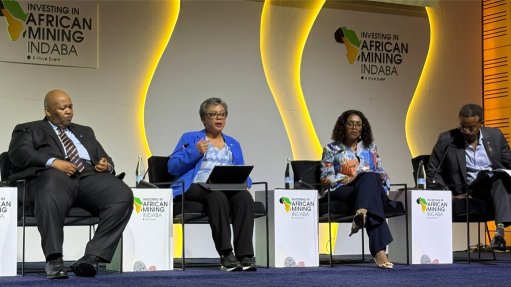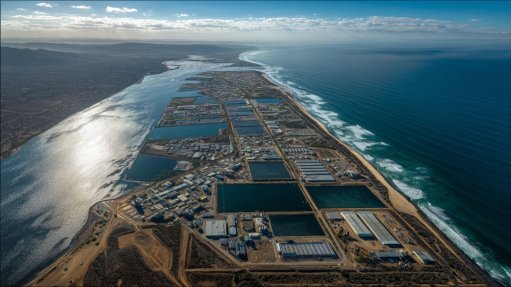Redesign of financing systems needed to get capital to where it can grow
When compared with other countries that have improved their level of development, there is no obvious reason why South Africa should not have higher levels of employment and faster economic growth, as it has deep and liquid capital markets but also high unemployment.
Elsewhere in the world where there are deep capital markets, generally there is tremendous innovation because of the need to fund projects. These projects usually result in improved productivity, which usually results in high real wages and increased employment.
“Capital markets are a vital and necessary condition for growth in South Africa, but, as we ought to be successful, it is necessary to tackle other barriers,” said financial services firm PSG Financial Services CEO Francois Gouws during PSG's 'The role of Capital Markets in SA' webinar on October 28.
Participants in the webinar discussed the six winning papers submitted for the PSG 2025 Think Big SA competition. The papers dealt with unlocking the capital market; rewiring South African capital markets to finance small and medium-sized enterprises (SMEs); using education district bonds for inclusive growth; how AI-driven microgrids can boost growth; how to deploy productive capital; and how capital markets can boost job creation by youth.
For any market to work, it needed investors and bankable companies looking to raise capital. The problem in South Africa was that, while there were many companies looking to raise capital and these were the companies that would be the employers in the future, these companies were not appealing enough to investors and they could not attract the right capital at their given share price, JSE CEO Dr Leila Fourie remarked.
There is a need for risk appetite to broaden. Markets are currently institution-based and with few speculative investors or investors that are willing to invest in the SME environment.
For example, the delistings from the JSE had been mostly in the small- and mid-cap space, and the reason was that they were unable to achieve the required share price or net asset value, and there was no appetite for investors to invest in the small-end of the market, Fourie said.
“We have not digitised access to financial markets in the way other countries have, but this requires a whole-of-community approach to set up,” she said.
However, financial services firm 27four Group CEO Fatima Vawda said the winning papers highlighted the need for the private sector, foreign direct investment, the retail market and informal and township economies to be involved in capital markets.
“This is where blended finance comes into play, as effective use of blended finance can help to derisk investments and bring in new forms of capital for funding the types of projects we need in South Africa to create economic growth and start this virtuous cycle.
“Further, from a capital markets perspective, there are a lot of ideas in the papers on how we can get multiple, diverse sets of investors to support the capital market,” she said.
However, this process is not frictionless and the country needs a frictionless way to boost liquidity.
“Institutional investors are looking for mechanisms to invest in SMEs and job creation, and the other types of investments needed in South Africa.
“For example, one of the papers on how to derisk infrastructure investments considers crowding-in other investors such as direct foreign investments and the private sector through blended finance. Then putting these projects through the capital markets could work,” she said.
In the 'From Plenty to Purpose: A Playbook for Productive Capital in South Africa' winning paper by Mpho Mashishi, he spoke about how aggregating finance can significantly lower the cost of capital, said Gouws.
Additionally, Mashishi also discussed inclusion and how to include informal and township economies and communal savings mechanisms, such as stokvels, into the modern economy. He proposed that they be included through creating inclusive platforms on which they could participate in these activities, which had rules and were transparent and better regulated, Gouws noted.
However, for capital markets to work, both sides of the equation needed to work. There needed to be ideas that could scale and people who wanted to be invested in these ideas. Investors stayed away if the investment environment was uncertain, said South African Reserve Bank economic research head and its Monetary Policy Committee member Chris Loewald.
“Therefore, we need macroeconomic-level certainty and a regulatory environment that allows for innovations to be deployed. For example, the AI-driven microgrids should be fast-tracked because, if there is a five- to ten-year wait for licences for such microgrids, then they would not be attractive to the local community nor investors,” he illustrated.
Further, the winning papers tackled specific aspects of the broader environment that were not working, with some papers focusing on information asymmetries and others on how to get money to small businesses and the problems they faced.
Other papers spoke about technology and using innovative ways to uncover where companies' revenue was derived from, how lenders could verify the information and how this could be used in the capital market environment to ensure funding went where it needed to, he said.
“There is a lot of innovative thinking in the papers that can be used directly in the policy environment.
“Another challenge is public investment. For many years, South Africa has had huge demand for network services and public services investments, but supply is failing and we know this. Where the innovation in the 'Move, Multiply, Matter' paper, by Jeannette Safi, lay is in identifying other countries in which particular parts of the investment pipeline were identified to have worked effectively.
“These examples, from Kenya, Colombia and the UK, can be pulled in and [Safi] described how particular parts can form part of a larger pipeline to solve some of South Africa's capital markets problems.”
There was a menu of examples that policy makers could select from, if they were willing to take some risks and invest in systems to make the problematic parts of the market work, emphasised Loewald.
Further, the primary concern was if the changes were not implemented, Gouws said.
“South Africa needs a roadmap with signposts for what people need to do. If we combine the papers, they provide a clear roadmap for success.
“We have fine institutions, including the National Treasury, the SARB and our law system, and we have capital markets. So, we should figure out why, despite this, we are not achieving success.
“This is also why PSG will continue to participate in these competitions: because they tackle the heart of the issues,” he said.
Article Enquiry
Email Article
Save Article
Feedback
To advertise email advertising@creamermedia.co.za or click here
Press Office
Announcements
What's On
Subscribe to improve your user experience...
Option 1 (equivalent of R125 a month):
Receive a weekly copy of Creamer Media's Engineering News & Mining Weekly magazine
(print copy for those in South Africa and e-magazine for those outside of South Africa)
Receive daily email newsletters
Access to full search results
Access archive of magazine back copies
Access to Projects in Progress
Access to ONE Research Report of your choice in PDF format
Option 2 (equivalent of R375 a month):
All benefits from Option 1
PLUS
Access to Creamer Media's Research Channel Africa for ALL Research Reports, in PDF format, on various industrial and mining sectors
including Electricity; Water; Energy Transition; Hydrogen; Roads, Rail and Ports; Coal; Gold; Platinum; Battery Metals; etc.
Already a subscriber?
Forgotten your password?
Receive weekly copy of Creamer Media's Engineering News & Mining Weekly magazine (print copy for those in South Africa and e-magazine for those outside of South Africa)
➕
Recieve daily email newsletters
➕
Access to full search results
➕
Access archive of magazine back copies
➕
Access to Projects in Progress
➕
Access to ONE Research Report of your choice in PDF format
RESEARCH CHANNEL AFRICA
R4500 (equivalent of R375 a month)
SUBSCRIBEAll benefits from Option 1
➕
Access to Creamer Media's Research Channel Africa for ALL Research Reports on various industrial and mining sectors, in PDF format, including on:
Electricity
➕
Water
➕
Energy Transition
➕
Hydrogen
➕
Roads, Rail and Ports
➕
Coal
➕
Gold
➕
Platinum
➕
Battery Metals
➕
etc.
Receive all benefits from Option 1 or Option 2 delivered to numerous people at your company
➕
Multiple User names and Passwords for simultaneous log-ins
➕
Intranet integration access to all in your organisation


















